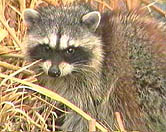
FRIDAY, Dec. 28 (HealthDay News) — Rare brain tumors found in raccoons in Northern California and Oregon may be linked to a new virus, according to a new study.
Researchers, led by scientists from the University of California, Davis, said their findings could shed light on how viruses cause cancer in both animals and humans.
“Understanding how infectious agents may contribute to cancer in animals has provided fundamental new knowledge on the cause of cancer in people,” Michael Lairmore, dean of the university’s School of Veterinary Medicine, said in a university news release.
Autopsies performed on raccoons beginning in March 2010 revealed 10 raccoons had brain tumors. Of these raccoons, nine were from Northern California. The additional raccoon was sent to the university by researchers at Oregon State University.
All of the tumors found in these raccoons had a new virus, known as raccoon polyomavirus. Since the study was completed, two more raccoons with brain tumors and the virus were found in two additional counties.
The study was published recently in the journal Emerging Infectious Diseases.
“Raccoons hardly ever get tumors,” noted study author Patricia Pesavento, a pathologist with the UC Davis School of Veterinary Medicine. “That’s why we take notice when we get three tumors, much less 12.”
Polyomaviruses are known to cause cancer under laboratory conditions. Less is known about their ability to cause cancer in people under normal conditions. Based on their findings, the researchers suggested this virus may play a role in tumor formation.
Humans and other animals are unlikely to become infected because polyomaviruses rarely spread between species, the researchers said.
The study’s authors noted there are high rates of cancer among wildlife living in close proximity to humans, and more research is needed to investigate other possible causes of the cancer, including environmental toxins and genetics.
“This is just the beginning of a story. Wildlife live in our fields, our trash cans, our sewer lines — and that’s where we dump things,” Pesavento said. “Humans need to be guardians of the wildlife-human interface, and raccoons are important sentinel animals. They really are exquisitely exposed to our waste. We may be contributing to their susceptibility in ways we haven’t discovered.”
Viruses and other infectious pathogens are linked to up to 20 percent of all human cancers worldwide, according to the American Cancer Society.
More information
The U.S. National Cancer Institute provides more information on cancer causes and risk factors.

